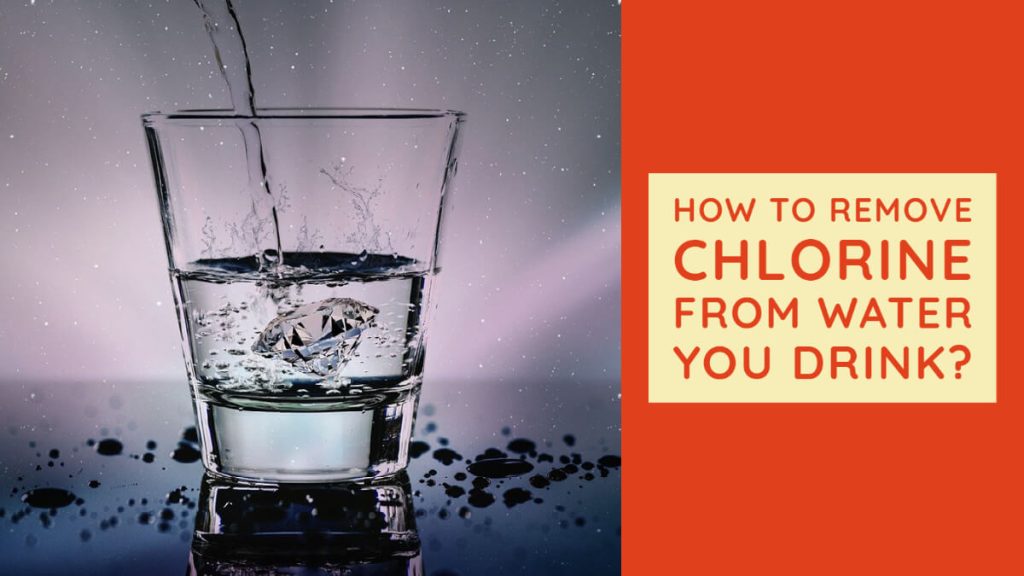Water is an essential resource for human beings. However, the quality of water that we consume is just as important as the quantity. Chlorine is a commonly used disinfectant added to public water systems to kill harmful bacteria and viruses. Although it is effective in purifying water, it can also adversely affect humans. This article will discuss the different ways to remove chlorine from water naturally.
Why Remove Chlorine from Water?
While chlorine is used to disinfect water and kill bacteria, it can also adversely affect human health. When chlorine reacts with organic matter in water, it forms byproducts such as trihalomethanes (THMs) that can harm human health. Exposure to high levels of chlorine and its byproducts can lead to several health problems, including cancer, reproductive issues, and congenital disabilities.
Additionally, chlorine can affect the taste and odor of water. The firm, pungent smell of chlorine can make water unpleasant to drink and affect the taste of food cooked with chlorinated water. Chlorine can also dry out and irritate the skin, making it unsuitable for bathing or showering.
Natural Ways to Remove Chlorine from Water
Fortunately, there are several natural ways to remove chlorine from water. These methods do not require expensive equipment or chemicals and can be easily implemented at home. Here are some of the most effective natural ways to remove chlorine from water:
1. Boiling
Boiling water is an effective way to remove chlorine from water. When water is boiled, the chlorine in it evaporates along with the steam. To remove chlorine from water by boiling, bring the water to a rolling boil for 20-30 minutes. Once the water has cooled, it will be free from chlorine.
However, boiling water is not a practical method for removing chlorine from large quantities of water. It is also not recommended for water high in dissolved solids or contaminants, as boiling can concentrate these impurities.
2. Letting Water Sit
Another natural way to remove chlorine from water is to let it sit in an open container. When water is exposed to air, its chlorine will slowly evaporate. This method is best suited for small quantities of water.
To remove chlorine from water by letting it sit, fill a container with water and let it sit out for at least 24 hours. After 24 hours, most of the chlorine in the water will have evaporated. However, this method is unsuitable for water high in dissolved solids or contaminants.
3. Activated Carbon Filters
Activated carbon filters are an effective way to remove chlorine from water. These filters use activated carbon to absorb the chlorine and its byproducts from the water. Activated carbon filters are commonly used in home water filtration systems and are available in various sizes and configurations.
To remove chlorine from water using an activated carbon filter, attach the filter to the water source and let the water flow through it. The filter will absorb the chlorine and its byproducts, freeing the water from contaminants. However, activated carbon filters must be replaced regularly to maintain effectiveness.
4. Vitamin C
Vitamin C is a powerful antioxidant that can also remove chlorine from water. Ascorbic acid, a form of vitamin C, reacts with chlorine to neutralize it and form harmless compounds. This method is easy, inexpensive, and suitable for small quantities of water.
Add a few drops of ascorbic acid to remove chlorine from water using vitamin C and stir well. Let the water sit for a few minutes to allow the ascorbic acid to react with the chlorine. After a few minutes, the water will be free from chlorine.
5. Use activated charcoal
Activated charcoal is a highly effective natural filter that can remove chlorine and other chemicals and pollutants from water. Activated charcoal works by adsorbing impurities in the water onto its surface, leaving the water clean and pure.
To use activated charcoal to remove chlorine from water, you must purchase a charcoal filter. These filters are widely available and are easy to install. Attach the filter to your faucet or use it in a water pitcher, and let the charcoal do its job.
6. Use a reverse osmosis system.
A reverse osmosis system is a highly effective way to remove chlorine and other contaminants from water. This system forces water through a semi-permeable membrane, which traps impurities and contaminants. The result is clean, pure water free from chlorine and other harmful chemicals.
Reverse osmosis systems are more expensive than other natural methods of removing chlorine from water, but they are highly effective and can be used to treat large volumes of water.
7. Sunlight
Sunlight can also be used to remove chlorine from water. When water is exposed to sunlight, the ultraviolet (UV) radiation breaks down the chlorine, leaving the water free of chlorine. To remove chlorine from water using sunlight, fill a clear container with water and place it in direct sunlight for several hours. The sunlight will break down the chlorine, leaving the water free of chlorine.
8. Aeration
Aeration is an effective method for removing chlorine from water. Aeration involves exposing the water to air, which allows the chlorine gas to escape from the water. To remove chlorine from water using aeration, fill a container with water and let it sit uncovered for several hours. The chlorine will escape from the water as it is exposed to air, leaving it free of chlorine.
In addition to the methods mentioned above, there are a few other natural ways to remove chlorine from water. These include:
- Adding lemon juice to water: Lemon juice is a natural source of citric acid, which can help to neutralize chlorine in water.
- Using clay or charcoal filters: Clay and charcoal are highly porous materials that can attract and absorb impurities from water, including chlorine.
- Using ozone water purification: Ozone is a powerful oxidizing agent that can react with chlorine to form harmless compounds.
Final Words
Chlorine is an effective disinfectant for water but can negatively impact our health and the environment. Fortunately, there are several natural methods for removing chlorine from water that are safe, effective, and do not require the use of harsh chemicals. Boiling, activated charcoal, vitamin C, sunlight, reverse osmosis system, activated carbon filters, water sit, and aeration are all effective methods for removing chlorine from water naturally. Using these methods, we can ensure that the water we drink is free of harmful chemicals and safe for our health and the environment.
FAQ’s Frequently asking question
Q: Why should I remove chlorine from my water?
A: Chlorine is added to water supplies to kill bacteria and other harmful microorganisms but can also adversely affect our health and the environment. Chlorine can react with organic matter to form disinfection byproducts (DBPs), some of which have been linked to an increased risk of cancer and reproductive problems.
Q: What are some natural methods for removing chlorine from water?
A: Boiling, activated charcoal, vitamin C, sunlight, and aeration are all effective natural methods for removing chlorine from water.
Q: How does boiling remove chlorine from water?
A: Boiling water causes chlorine gas to be released into the air, leaving the water free of chlorine.
Q: How does activated charcoal remove chlorine from water?
A: Activated charcoal is a highly porous material that can absorb impurities, including chlorine, from water.
Q: How does vitamin C remove chlorine from water?
A: Vitamin C reacts with chlorine to neutralize it, leaving the water free of chlorine.
Q: How does sunlight remove chlorine from water?
A: When water is exposed to sunlight, the ultraviolet (UV) radiation breaks down the chlorine, leaving the water free of chlorine.
Q: How does aeration remove chlorine from water?
A: Aeration involves exposing the water to air, allowing the chlorine gas to escape.
Q: Are these natural methods for removing chlorine from water effective?
A: These natural methods are effective at removing chlorine from water. However, the effectiveness may vary depending on the concentration of chlorine in the water and the method used.
Q: Are these natural methods safe to use?
A: These natural methods are safe to use and do not require harsh chemicals.
Q: Can these natural methods remove other impurities from water?
A: Some methods, such as activated charcoal, can also remove other impurities from water. However, the effectiveness may vary depending on the type and concentration of impurities in the water.
Q: How do I know how to remove chlorine from my water?
A: The method you use may depend on personal preference, availability of materials, and the concentration of chlorine in the water. Trying several methods to see which works best for you may be helpful.

